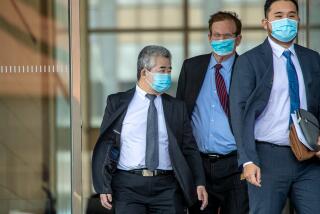Overton’s Illness Prompts Delay in Trial : Courts: Judge decided on postponement despite the defendant’s quick hospital release. Observers say the move could benefit the defense.
- Share via
SANTA ANA — The sudden illness of murder defendant Richard K. Overton forced a postponement of his trial for more than a month, a development that several court observers said Friday could benefit the defense.
Overton, who was taken to Western Medical Center-Santa Ana Thursday after complaining of chest pains and dizziness, was released in good health Friday after an overnight evaluation, a hospital spokesman said.
Despite his fairly quick release, Orange County Superior Court Judge David O. Carter decided to delay resuming the trial to accommodate jurors’ vacations and give attorneys time to reschedule expert witnesses, many of whom have to be flown in from around the country. The case is set to resume Sept. 29.
Overton, 64, of Dana Point is on trial on a charge of poisoning his wife, Janet L. Overton, with a lethal dose of cyanide. The part-time college professor and computer consultant, who has denied the charge, suffered the illness Thursday before he was scheduled to take the witness stand for his fourth day of testimony.
Deputy Dist. Atty. Christopher J. Evans and defense attorney Robert D. Chatterton have declined comment on how the delay will affect their cases. Dist. Atty. Michael R. Capizzi also refused to “speculate” on the potential impact of the delay, but admitted that his “preference is move things along once they start rolling.”
But on Friday, several local attorneys and court observers offered their opinions on the postponement, with most believing the delay would help the defense.
Some criminal attorneys said the prosecutor, who must present his evidence first, would be at a disadvantage because they believed the case would erode with the passage of time. Jurors’ memories tend to fade as the trial drags on, they said.
“Many of the favorable impressions he made might dim for the jurors,” said defense attorney Allan H. Stokke, who recently successfully represented a Tustin businessman accused of a murder-for-hire plot. “A trial is a contest of impressions as much as it is a contest of facts,” Stokke said.
Referring to Overton’s contentious cross-examination, he said that negative, as well positive, images might disappear during a postponement.
Federal Public Defender H. Dean Steward, who has been following the trial, agreed with Stokke. He likened a defense to “an old wine. . . . It can only get better with age.”
He added that a longer trial is more likely to confuse a jury as it grapples to remember the sequence of evidence presented in a case. That could be true in Overton’s case because of the amount of technical evidence regarding poisons and crucial medical testimony.
According to Samuel Frizell, a professor at Western State University College of Law and an expert on juries, there is also a possibility of juror attrition due to illnesses or injury, which he said could lead to a mistrial. In the event of a mistrial, the defense learns exactly how the prosecutor would present the case and could prepare for a second trial accordingly.
However, Marshall M. Schulman, a former prosecutor known for handling the notorious “Onion Field” case and now a defense attorney, said the defense usually suffers in most delays.
“Juries become angry at delays and are more susceptible to outside influences,” he said. “When they get upset, they tend to take it out on somebody and the easiest person is the defendant.”
But jury consultant Leo Snowiss said he thought a delay would have little effect on either side. “It’s kind of like a rain delay in a baseball game,” said Snowiss, who is also a associate professor of political science at UCLA.
He agreed that a delay might “take some of the edge off” earlier evidence, but said that juries tend to take their civic responsibility very seriously, especially in murder trials.
Snowiss, who was not aware of the facts of the case, complimented the judge for accommodating the jurors’ vacation schedules. “I think that was very smart. The judge is obviously very concerned about resentment among the jurors.”
More to Read
Sign up for Essential California
The most important California stories and recommendations in your inbox every morning.
You may occasionally receive promotional content from the Los Angeles Times.













